Fleurs du Mal Magazine


Het was Frans-Joseph die de nieuwe tijd naar het dorp had gehaald, toen hij het gezellenhuis had laten bouwen. Jonggezellen op kamertjes hadden meisjes nodig. Een van de kasteleins was op die behoefte ingesprongen, had rode lampen voor het raam gezet en meisjes uit de stad laten komen.
 Frans-Joseph dacht als een grootindustrieel. Hij was ook de man die het grote flatgebouw had laten bouwen, net niet zo hoog als de silo. Zestig woningen in vier lagen, niet ver van de fabriek. Flats voor buitenlandse gezinnen met veel kinderen die later, naar hij dacht, vanzelf in de fabriek zouden gaan werken. Maar daar had hij zich in misrekend. Met de fabriek liep het mis toen de kinderen groot waren. Bovendien wilden de zonen van de gastarbeiders geen werkezels zijn zoals hun vaders.
Frans-Joseph dacht als een grootindustrieel. Hij was ook de man die het grote flatgebouw had laten bouwen, net niet zo hoog als de silo. Zestig woningen in vier lagen, niet ver van de fabriek. Flats voor buitenlandse gezinnen met veel kinderen die later, naar hij dacht, vanzelf in de fabriek zouden gaan werken. Maar daar had hij zich in misrekend. Met de fabriek liep het mis toen de kinderen groot waren. Bovendien wilden de zonen van de gastarbeiders geen werkezels zijn zoals hun vaders.
Mels rommelt wat in de paperassen. Vraagt zich af of hij al de kladjes en volgeschreven vellen toch nog kan ordenen tot een boek. Een exemplaar voor zichzelf. Na zijn dood kan dat naar het archief van de gemeente.
Hij heeft moeite om het verhaal rond te maken. Hij zit met te veel losse stukjes. Van de arbeidersfamilies die in de jaren zeventig naar het dorp kwamen, weet hij maar weinig. In de flats is hij nooit geweest.
Vanaf de dag dat de fabriek gesloten is en de arbeiders uit de uitgewoonde flatwoningen zijn vertrokken, op zoek naar werk elders of door verhuizing naar de nieuwe wijken in het dorp, staat de flat erbij als een blind bakbeest. Kapotgegooide ruiten. Uitgebroken sponningen. Graffiti, waaruit nog steeds de haat van de nieuwkomers tegen de oorspronkelijke dorpsbevolking af te lezen is. En omgekeerd. Het heeft nooit geboterd tussen de flatbewoners en de dorpelingen.
Er zijn nog een paar flats bewoond. Enkele weduwvrouwen die nergens naartoe kunnen en een halfdemente man die wacht op een plaats in een inrichting. En mevrouw Lecoeur, de hoerenmadam, die er, samen met een paar jongere vrouwen, mannen ontvangt. Iedereen spreekt er schande van. Niemand doet er wat aan. Mels weet niet wat hij van haar moet denken. In het café, waar ze elke ochtend komt en koffie met cognac drinkt, praat hij wel eens met haar. Ze is innemend. Als ze over de mannen praat die haar meisjes bezoeken, is het net alsof ze het over haar jongens heeft. In haar ogen zijn mannen kinderen die beschermd en getroost moeten worden.
Hij doet de mappen dicht, trekt zijn jas aan, slaat de plaid over zijn benen, rolt naar de lift en gaat naar beneden.
Hij weet dat Lizet in de keuken is en luistert. Het blijft stil. Ze negeert hem.
Hij opent de deur en rijdt naar buiten.
Even stopt hij bij de marktkramen die ze aan het opbouwen zijn. Eén middag in de week is er markt. Een kraam met groenten en fruit, een kaaswagen, een viskar, een poelier met roze kippen en konijnen, een broodjesbar, een Turkse kraam met olijven, dadels en paprika’s.
Bij de bakkerskraam koopt hij krentenbollen. Met de zak broodjes op schoot rijdt hij de straat uit.
Ton van Reen: Het diepste blauw (088)
wordt vervolgd
• fleursdumal.nl magazine
More in: - Book News, - Het diepste blauw, Archive Q-R, Reen, Ton van
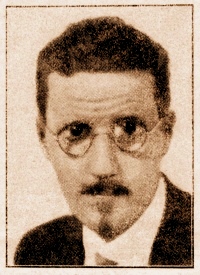
A Flower
Given to My Daughter
Frail the white rose and frail are
Her hands that gave
Whose soul is sere and paler
Than time’s wan wave.
Rosefrail and fair — yet frailest
A wonder wild
In gentle eyes thou veilest,
My blueveined child.
James Joyce
(1882-1941)
A Flower Given to My Daughter
• fleursdumal.nl magazine
More in: Archive I-J, Archive I-J, Joyce, James, Joyce, James
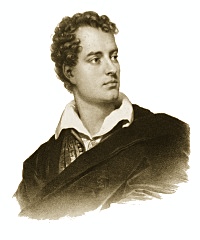
I Would I Were a Careless Child
I would I were a careless child,
Still dwelling in my Highland cave,
Or roaming through the dusky wild,
Or bounding o’er the dark blue wave;
The cumbrous pomp of Saxon pride
Accords not with the freeborn soul,
Which loves the mountain’s craggy side,
And seeks the rocks where billows roll.
Fortune! take back these cultured lands,
Take back this name of splendid sound!
I hate the touch of servile hands,
I hate the slaves that cringe around.
Place me among the rocks I love,
Which sound to Ocean’s wildest roar;
I ask but this – again to rove
Through scenes my youth hath known before.
Few are my years, and yet I feel
The world was ne’er designed for me:
Ah! why do dark’ning shades conceal
The hour when man must cease to be?
Once I beheld a splendid dream,
A visionary scene of bliss:
Truth! – wherefore did thy hated beam
Awake me to a world like this?
I loves – but those I love are gone;
Had friends – my early friends are fled:
How cheerless feels the heart alone,
When all its former hopes are dead!
Though gay companions o’er the bowl
Dispel awhile the sense of ill’
Though pleasure stirs the maddening soul,
The heart – the heart – is lonely still.
How dull! to hear the voice of those
Whom rank or chance, whom wealth or power,
Have made, though neither friends nor foes,
Associates of the festive hour.
Give me again a faithful few,
In years and feelings still the same,
And I will fly the midnight crew,
Where boist’rous joy is but a name.
And woman, lovely woman! thou,
My hope, my comforter, my all!
How cold must be my bosom now,
When e’en thy smiles begin to pall!
Without a sigh would I resign
This busy scene of splendid woe,
To make that calm contentment mine,
Which virtue know, or seems to know.
Fain would I fly the haunts of men –
I seek to shun, not hate mankind;
My breast requires the sullen glen,
Whose gloom may suit a darken’d mind.
Oh! that to me the wings were given
Which bear the turtle to her nest!
Then would I cleave the vault of heaven,
To flee away, and be at rest.
George Gordon Byron
(1788 – 1824)
I Would I Were a Careless Child
(Poem)
• fleursdumal.nl magazine
More in: Archive A-B, Archive A-B, Byron, Lord
Hannah Sullivan’s debut collection is a revelation – three long poems of fresh ambition, intensity, and substance.
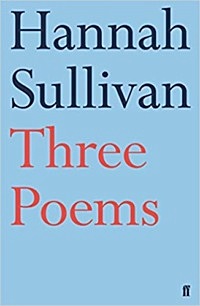 Though each poem stands apart, their inventive and looping encounters make for a compelling unity.
Though each poem stands apart, their inventive and looping encounters make for a compelling unity.
“You, Very Young in New York” captures a great American city, in all its alluring detail. It is a wry and tender study of romantic possibility, disappointment, and the obduracy of innocence.
“Repeat until Time” begins with a move to California and unfolds into an essay on repetition and returning home, at once personal and philosophical.
“The Sandpit after Rain” explores the birth of a child and the loss of a father with exacting clarity.
In Three Poems, readers will experience Sullivan’s work with the same exhilaration as they might the great modernizing poems of Eliot and Pound, but with the unique perspective of a brilliant new female voice.
Hannah Sullivan lives in London with her husband and two sons and is an Associate Professor of English at New College, Oxford. She received her PhD from Harvard in 2008 and taught in California for four years.
She is currently associate professor of English at New College, Oxford. Her study of modernist writing, The Work of Revision, was published in 2013 and awarded the Rose Mary Crawshay Prize by the British Academy. Her debut poetry collection, Three Poems, was published by Faber in 2018 and was awarded the prestigious TS Eliot Prize.
Three Poems
by Hannah Sullivan
Paperback: 80 pages
Publisher: Faber & Faber; Main edition (18 Jan. 2018)
Language: English
ISBN-10: 9780571337675
ISBN-13: 978-0571337675
ASIN: 0571337678
Product Dimensions: 15.9 x 1.3 x 21 cm
# new poetry
Three Poems
by Hannah Sullivan
• fleursdumal.nl magazine
More in: - Book News, - Bookstores, Archive S-T, Archive S-T, Art & Literature News, Awards & Prizes
Franz Kafka remains one of the most influential writers of the twentieth century. 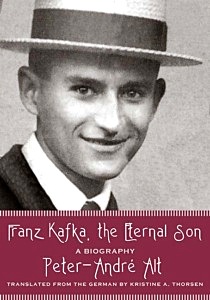
His novels, stories, and letters are still regarded today as the epitome of the dark, fascinating, and uncanny, a model of the modernist aesthetic.
Peter-André Alt’s landmark biography, Franz Kafka, the Eternal Son, recounts and explores Kafka’s life and literary work throughout the cultural and political upheavals of central Europe.
Alt’s biography explores Franz Kafka’s own view of life and writing as a unity that shaped his identity. He locates links and echoes among the author’s work, life, and surroundings, situating him within the traditions of Prague’s German literature, modernity, psychoanalysis, and philosophy as well as within its Jewish culture, arts, theater, and intellectual tradition.
In this biographical tour de force, Kafka emerges as an observant flaneur and wistful loner, an anxious ascetic, an ecstatic and skeptic, a specialist in terror, and a master of irony. Alt masterfully illuminates Kafka’s life not as source material but as a mirror of his literary genius. Readers begin to see Kafka’s unforgettable novels and stories as shards reflecting the life of their creator.
About the Author
Peter-André André Alt is a German literary scholar and the president of the Free University in Berlin.
Kristine A, Thorsen is a lecturer emeritus of German at Northwestern University.
Franz Kafka, the Eternal Son
A Biography
Contributors
Peter-André Alt (Author)
Kristine Thorsen (Translator)
Publication Date September 2018
Categories Biography
704 pages
Trim Size 7 x 10
ISBN 0-8101-2607-9
Northwestern University Press
-Cloth Text
– $120.00
ISBN 978-0-8101-6243-3
-Paper Text
– $45.00
ISBN 978-0-8101-2607-7
# new books
Franz Kafka
A Biography
• fleursdumal.nl magazine
More in: - Book News, - Book Stories, Archive A-B, Archive K-L, Archive K-L, Art & Literature News, Franz Kafka, Kafka, Franz, Kafka, Franz, MONTAIGNE
Ian Buruma, (Den Haag, 1951) is een internationaal befaamd essayist, historicus en Azië-deskundige. Hij schrijft regelmatig voor The New Yorker, The New York Review of Books en in ons eigen land voor NRC Handelsblad, en werkte mee aan documentaires voor de BBC en CNN.
 Momenteel is hij hoogleraar Democracy, Human Rights and Journalism aan het Bard College in New York.
Momenteel is hij hoogleraar Democracy, Human Rights and Journalism aan het Bard College in New York.
In 2008 ontving Buruma de Erasmusprijs voor zijn buitengewone bijdrage aan de Nederlandse cultuur.
Tot zijn bekendste boeken horen Occidentalisme, De spiegel van de zonnegodin, Dood van een gezonde roker, Het loon van de schuld en 1945. Biografie van een jaar en Hun beloofde land. Mijn grootouders in tijden van liefde en oorlog. In 2018 verscheen Tokio mon amour. Japanse avonturen, het portret van een jonge schrijver en van de stad die hem mede vormde.
Op donderdag 25 april a.s. ontvangt Ian Buruma de Gouden Ganzenveer 2019.
• fleursdumal.nl magazine
More in: - Book Lovers, - Book News, Archive A-B, Art & Literature News, Awards & Prizes, PRESS & PUBLISHING
Mels is met zijn vader in het café en mag bier tappen omdat de kastelein meedoet met kaarten.
Hij bedient de paar mannen die op het terras zitten.
 Mannen van het soort dat hier eerst verdwaald leek, maar van wie hij nu weet dat het wandelaars zijn die de Wijer nalopen. Van de monding van de beek in de rivier terug naar de bron. Ze dragen hoge laarzen om door de broeklanden en rietvelden te stappen.
Mannen van het soort dat hier eerst verdwaald leek, maar van wie hij nu weet dat het wandelaars zijn die de Wijer nalopen. Van de monding van de beek in de rivier terug naar de bron. Ze dragen hoge laarzen om door de broeklanden en rietvelden te stappen.
Over hun rug kijkt hij mee naar de kaart van het riviertje en het opengeslagen boek op tafel. Hij verbaast zich erover dat de Wijer meer dan honderd kilometer lang is en dat de bron ergens ligt bij een dorp dat Weierwiese heet. En dat het officieel geen beek maar een rivier is. En dat er honderdtachtig soorten vis in zitten, terwijl hij er maar tien kent. En dat hij nog nooit een zoetwaterkreeft met schaarvormige kaken heeft gezien. Geen wonder, want volgens het onderschrift bij het plaatje van het dier is het nog geen halve centimeter groot.
De mannen drinken chocomel. De bierdrinkende kerels die zitten te kaarten, lachen hen uit. Mels is boos, vooral over de opmerkingen van meneer Frans-Joseph. Die scheldt de wandelaars uit voor mietjes en hoerenlopers. Het is extra gênant omdat iedereen weet dat hij zelf een hoerenloper is.
Ton van Reen: Het diepste blauw (087)
wordt vervolgd
• fleursdumal.nl magazine
More in: - Book News, - Het diepste blauw, Archive Q-R, Reen, Ton van
Dictatuur, schendingen van mensenrechten, milieuvervuiling, verdronken vluchtelingen: dit zijn niet alleen de urgentste kwesties in de wereldpolitiek, maar ook de thema’s in het werk van Ai Weiwei.
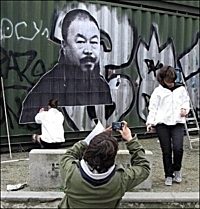 Met zijn enorm veelzijdige creativiteit en maatschappelijke engagement zet hij als een van de beroemdste en grootste kunstenaars van onze tijd vrijwel alles op het spel: hij werd gearresteerd, zijn paspoort werd ingenomen, en afgelopen zomer nog sloopten de Chinese autoriteiten zonder waarschuwing zijn studio in Beijing.
Met zijn enorm veelzijdige creativiteit en maatschappelijke engagement zet hij als een van de beroemdste en grootste kunstenaars van onze tijd vrijwel alles op het spel: hij werd gearresteerd, zijn paspoort werd ingenomen, en afgelopen zomer nog sloopten de Chinese autoriteiten zonder waarschuwing zijn studio in Beijing.
Als geen ander kan Ai Weiwei dus vertellen over de verantwoordelijkheid van de kunstenaar. Wat vermag de kunst in een tijd waarin dissidenten worden opgesloten en journalisten zonder pardon het land uit worden gezet?
Hoe ver mag de kunstenaar gaan?
Hoe ver moét hij gaan?
Hoor het bij de Nexus-lezing 2019, The Responsibilities of an Artist.
The Responsibilities of an Artist
Nexus-lezing Ai Weiwei
25 mei 2019
14.30 – 17.30
Aula VU Amsterdamhttps://nexus-instituut.nl/
# meer informatie op website nexus-instituut
• fleursdumal.nl magazine
More in: Ai Weiwei, Art & Literature News, AUDIO, CINEMA, RADIO & TV, DICTIONARY OF IDEAS, Nexus Instituut
The Match-Maker
The grill-room clock struck eleven with the respectful unobtrusiveness of one whose mission in life is to be ignored. When the flight of time should really have rendered abstinence and migration imperative the lighting apparatus would signal the fact in the usual way.
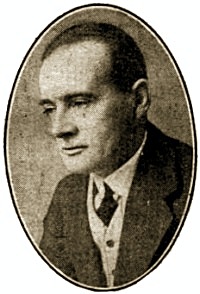 Six minutes later Clovis approached the supper-table, in the blessed expectancy of one who has dined sketchily and long ago.
Six minutes later Clovis approached the supper-table, in the blessed expectancy of one who has dined sketchily and long ago.
“I’m starving,” he announced, making an effort to sit down gracefully and read the menu at the same time.
“So I gathered;” said his host, “from the fact that you were nearly punctual. I ought to have told you that I’m a Food Reformer. I’ve ordered two bowls of bread-and-milk and some health biscuits. I hope you don’t mind.”
Clovis pretended afterwards that he didn’t go white above the collar-line for the fraction of a second.
“All the same,” he said, “you ought not to joke about such things. There really are such people. I’ve known people who’ve met them. To think of all the adorable things there are to eat in the world, and then to go through life munching sawdust and being proud of it.”
“They’re like the Flagellants of the Middle Ages, who went about mortifying themselves.”
“They had some excuse,” said Clovis. “They did it to save their immortal souls, didn’t they? You needn’t tell me that a man who doesn’t love oysters and asparagus and good wines has got a soul, or a stomach either. He’s simply got the instinct for being unhappy highly developed.”
Clovis relapsed for a few golden moments into tender intimacies with a succession of rapidly disappearing oysters.
“I think oysters are more beautiful than any religion,” he resumed presently. “They not only forgive our unkindness to them; they justify it, they incite us to go on being perfectly horrid to them. Once they arrive at the supper-table they seem to enter thoroughly into the spirit of the thing. There’s nothing in Christianity or Buddhism that quite matches the sympathetic unselfishness of an oyster. Do you like my new waistcoat? I’m wearing it for the first time to-night.”
“It looks like a great many others you’ve had lately, only worse. New dinner waistcoats are becoming a habit with you.”
“They say one always pays for the excesses of one’s youth; mercifully that isn’t true about one’s clothes. My mother is thinking of getting married.”
“Again!”
“It’s the first time.”
“Of course, you ought to know. I was under the impression that she’d been married once or twice at least.”
“Three times, to be mathematically exact. I meant that it was the first time she’d thought about getting married; the other times she did it without thinking. As a matter of fact, it’s really I who am doing the thinking for her in this case. You see, it’s quite two years since her last husband died.”
“You evidently think that brevity is the soul of widowhood.”
“Well, it struck me that she was getting moped, and beginning to settle down, which wouldn’t suit her a bit. The first symptom that I noticed was when she began to complain that we were living beyond our income. All decent people live beyond their incomes nowadays, and those who aren’t respectable live beyond other peoples. A few gifted individuals manage to do both.”
“It’s hardly so much a gift as an industry.”
“The crisis came,” returned Clovis, “when she suddenly started the theory that late hours were bad for one, and wanted me to be in by one o’clock every night. Imagine that sort of thing for me, who was eighteen on my last birthday.”
“On your last two birthdays, to be mathematically exact.”
“Oh, well, that’s not my fault. I’m not going to arrive at nineteen as long as my mother remains at thirty-seven. One must have some regard for appearances.”
“Perhaps your mother would age a little in the process of settling down.”
“That’s the last thing she’d think of. Feminine reformations always start in on the failings of other people. That’s why I was so keen on the husband idea.”
“Did you go as far as to select the gentleman, or did you merely throw out a general idea, and trust to the force of suggestion?”
“If one wants a thing done in a hurry one must see to it oneself. I found a military Johnny hanging round on a loose end at the club, and took him home to lunch once or twice. He’d spent most of his life on the Indian frontier, building roads, and relieving famines and minimizing earthquakes, and all that sort of thing that one does do on frontiers. He could talk sense to a peevish cobra in fifteen native languages, and probably knew what to do if you found a rogue elephant on your croquet-lawn; but he was shy and diffident with women. I told my mother privately that he was an absolute woman-hater; so, of course, she laid herself out to flirt all she knew, which isn’t a little.”
“And was the gentleman responsive?”
“I hear he told some one at the club that he was looking out for a Colonial job, with plenty of hard work, for a young friend of his, so I gather that he has some idea of marrying into the family.”
“You seem destined to be the victim of the reformation, after all.”
Clovis wiped the trace of Turkish coffee and the beginnings of a smile from his lips, and slowly lowered his dexter eyelid. Which, being interpreted, probably meant, “I DON’T think!”
The Match-Maker
From ‘The Chronicles of Clovis’
by Saki (H. H. Munro)
(1870 – 1916)
fleursdumal.nl magazine
More in: Archive S-T, Saki, Saki, The Art of Reading
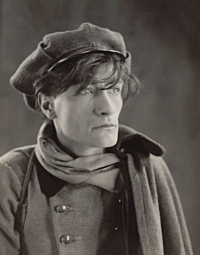
Poète noir
Poète noir, un sein de pucelle
te hante,
poète aigri, la vie bout
et la ville brûle,
et le ciel se résorbe en pluie,
ta plume gratte au cœur de la vie.
Forêt, forêt, des yeux fourmillent
sur les pignons multipliés ;
cheveux d’orage, les poètes
enfourchent des chevaux, des chiens.
Les yeux ragent, les langues tournent,
le ciel afflue dans les narines
comme un lait nourricier et bleu ;
je suis suspendu à vos bouches
femmes, cœurs de vinaigre durs.
Antonin Artaud
(1896 — 1948)
Poète noir
Poème
• fleursdumal.nl magazine
More in: Antonin Artaud, Archive A-B, Archive A-B, Artaud, Antonin
Wir leben im Zeitalter des Gedichts.
Die Poesie ist auf Erfolgskurs, schließlich sind einige der begabtesten Autoren einer ganzen Generation in der Lyrikszene zu finden. Warum das so ist und was die Lyrik der Gegenwart auszeichnet, erzählt Christian Metz in seinem grundlegenden Essay.
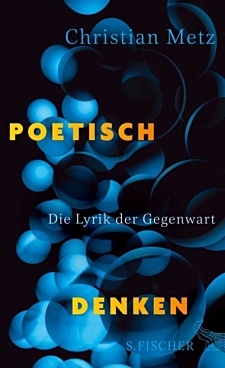 Angetrieben von den epochalen Veränderungen unserer Zeit forciert die Lyrik der Gegenwart ein poetisches Denken. Es ist ein Denken mit poetischen Mitteln, das der sinnlichen Erfahrung, der Leidenschaft und dem Spiel Raum gibt. In dieses poetische Denken führt Metz systematisch ein. Ausgehend von ihren Gemeinsamkeiten folgt Metz einigen der wichtigsten Autorinnen und Autoren der neuen Lyrik – wie Monika Rinck und Jan Wagner, Ann Cotten und Steffen Popp – in ihr poetisches Universum.
Angetrieben von den epochalen Veränderungen unserer Zeit forciert die Lyrik der Gegenwart ein poetisches Denken. Es ist ein Denken mit poetischen Mitteln, das der sinnlichen Erfahrung, der Leidenschaft und dem Spiel Raum gibt. In dieses poetische Denken führt Metz systematisch ein. Ausgehend von ihren Gemeinsamkeiten folgt Metz einigen der wichtigsten Autorinnen und Autoren der neuen Lyrik – wie Monika Rinck und Jan Wagner, Ann Cotten und Steffen Popp – in ihr poetisches Universum.
Christian Metz, geboren 1975, nach seiner Rückkehr von der Cornell University Stipendiat der Alexander von Humboldt-Stiftung an der LMU in München. Jahrelang wissenschaftlicher Mitarbeiter am Institut für deutsche Literatur und ihre Didaktik an der Goethe-Universität Frankfurt und Literaturkritiker für die »Frankfurter Allgemeine Zeitung«. Promotion mit einer Arbeit zur »Narratologie der Liebe«. Habilitation zum Thema: »Kitzel. Studien zur Kultur einer menschlichen Empfindung«, deren Monographie bei S. Fischer Wissenschaft im Herbst 2019 erscheint. Lehraufträge an der Humboldt-Universität zu Berlin und der Universität Tromsø (Norwegen). Schwerpunkte in Forschung und Lehre: Literatur vom 17. Jahrhundert bis zur Gegenwart, Literaturtheorie, Anthropologie und Literatur. Gemeinsam mit Ina Hartwig und Oliver Vogel Herausgeber der »Neuen Rundschau. Gegenwartsliteratur!« (Heft 2015/1).
Christian Metz
Poetisch denken
Die Lyrik der Gegenwart
Erscheinungstermin: 04.10.2018
Umfang: 432 Seiten
Paperback
ISBN-10: 3100024400
ISBN-13: 978-3100024404
Verlag: S. FISCHER
Lyrik
Sprache: Deutsch
Nr. 473 in Literaturkritik
Nr. 14136 in Film, Kunst & Kultur
432 Seiten
13,4 x 3,2 x 21,5 cm
Paperback Preis € 20,00
# new books
Christian Metz
Poetisch denken
• fleursdumal.nl magazine
More in: - Book News, - Bookstores, Archive M-N, Archive M-N, Art & Literature News, MODERN POETRY, STREET POETRY
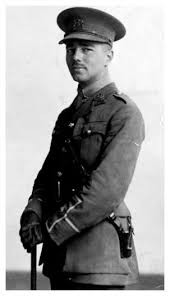
A Terre
(Being the philosophy of many Soldiers.)
Sit on the bed; I’m blind, and three parts shell.
Be careful; can’t shake hands now; never shall.
Both arms have mutinied against me,—brutes.
My fingers fidget like ten idle brats.
I tried to peg out soldierly,—no use!
One dies of war like any old disease.
This bandage feels like pennies on my eyes.
I have my medals?—Discs to make eyes close.
My glorious ribbons?—Ripped from my own back
In scarlet shreds. (That’s for your poetry book.)
A short life and a merry one, my buck!
We used to say we’d hate to live dead-old,—
Yet now … I’d willingly be puffy, bald,
And patriotic. Buffers catch from boys
At least the jokes hurled at them. I suppose
Little I’d ever teach a son, but hitting,
Shooting, war, hunting, all the arts of hurting.
Well, that’s what I learnt,—that, and making money.
Your fifty years ahead seem none too many?
Tell me how long I’ve got? God! For one year
To help myself to nothing more than air!
One Spring! Is one too good to spare, too long?
Spring wind would work its own way to my lung,
And grow me legs as quick as lilac-shoots.
My servant’s lamed, but listen how he shouts!
When I’m lugged out, he’ll still be good for that.
Here in this mummy-case, you know, I’ve thought
How well I might have swept his floors for ever.
I’d ask no night off when the bustle’s over,
Enjoying so the dirt. Who’s prejudiced
Against a grimed hand when his own’s quite dust,
Less live than specks that in the sun-shafts turn,
Less warm than dust that mixes with arms’ tan?
I’d love to be a sweep, now, black as Town,
Yes, or a muckman. Must I be his load?
O Life, Life, let me breathe,—a dug-out rat!
Not worse than ours the lives rats lead—
Nosing along at night down some safe rut,
They find a shell-proof home before they rot.
Dead men may envy living mites in cheese,
Or good germs even. Microbes have their joys,
And subdivide, and never come to death.
Certainly flowers have the easiest time on earth.
“I shall be one with nature, herb, and stone,”
Shelley would tell me. Shelley would be stunned:
The dullest Tommy hugs that fancy now.
“Pushing up daisies,” is their creed, you know.
To grain, then, go my fat, to buds my sap,
For all the usefulness there is in soap.
D’you think the Boche will ever stew man-soup?
Some day, no doubt, if …
Friend, be very sure
I shall be better off with plants that share
More peaceably the meadow and the shower.
Soft rains will touch me,— as they could touch once,
And nothing but the sun shall make me ware.
Your guns may crash around me. I’ll not hear;
Or, if I wince, I shall not know I wince.
Don’t take my soul’s poor comfort for your jest.
Soldiers may grow a soul when turned to fronds,
But here the thing’s best left at home with friends.
My soul’s a little grief, grappling your chest,
To climb your throat on sobs; easily chased
On other sighs and wiped by fresher winds.
Carry my crying spirit till it’s weaned
To do without what blood remained these wounds.
Wilfred Owen
(1893 – 1918)
A Terre (Poem)
• fleursdumal.nl magazine
More in: Archive O-P, Archive O-P, Galerie des Morts, Owen, Wilfred, WAR & PEACE
Thank you for reading Fleurs du Mal - magazine for art & literature